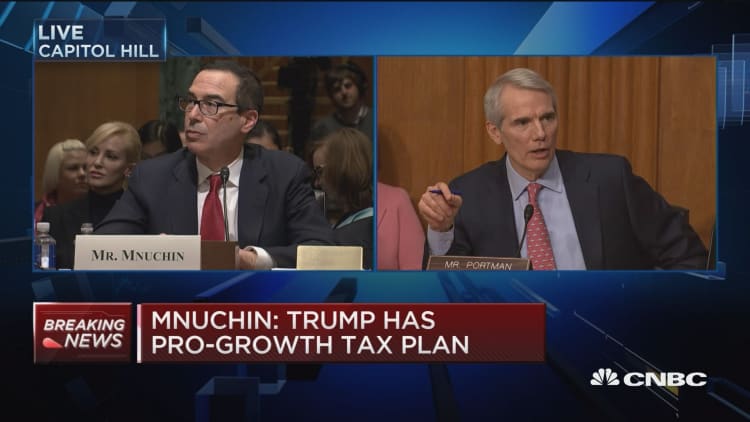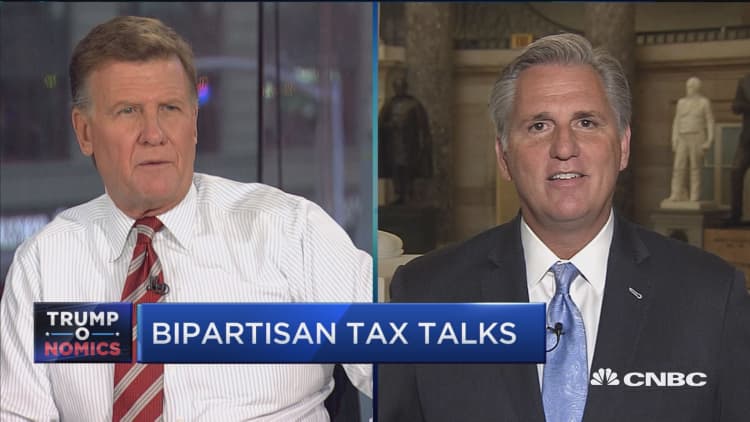Every announcement Apple makes is a big one, but Tuesday's quarterly results may be the company's most closely watched event in years. CEO Tim Cook won't be revealing a new iPhone, but it's likely he will shed some light on how the business plans to bring the $285 billion it's holding overseas back into America.
Ever since President Donald Trump revealed in December that he would reduce the tax hit on money repatriated into America — from a 35 percent tax rate to 15.5 percent on profits in cash and other liquid assets — all eyes have been on Apple, which has the biggest overseas bank account out of any company. It is Apple's No. 1 priority, according to senior vice president and CFO Luca Maestri, who noted that if the tax rate was lowered, it would give the company "flexibility around its capital return activities" last year at a Goldman Sachs investor conference.
That money, which is mostly held in short-term U.S. bonds and money market funds, was kept in Ireland for years, until an investigation by the European Union into whether the company failed to pay taxes caused it to move its holdings to Jersey, a small island off the coast of Normandy that rarely taxes corporations. (Apple owes Ireland $15.4 billion in unpaid taxes and has implemented a plan to make the payments but continues to appeal the EU decision.)
Investors have been waiting patiently since December's tax plan came out to find out exactly how the company plans to move its money from Europe into America and what it will do with those funds once they arrive back home.
"This is a very big deal to long-term investors, as cash has been hoarded by Apple on the balance sheet for the past decade," said Angelo Zino, a senior industry analyst with CFRA Research. "I think everyone is awaiting details on this call to better grasp its cash usage strategy."
'A drop in the bucket'
While many details are still to be determined, investors already know a few things about Apple's plans and how this might play out. First, Apple is expected to pay about $38 billion in taxes when it brings its money onshore, but it won't pay it all at once.
Instead, it will pay the taxman back over eight years, with 8 percent being paid per year over the next five years and the rest, about 60 percent of its tax owing, being paid in the final three years. This ensures that the impact on Apple will be virtually nil, as it produces about $60 billion in free cash flow every year.
"It's a drop in the bucket," Zino said.
It's also likely that Apple will use its repatriated funds to buy back shares and raise its dividend. According to Shawn Harrison, an analyst at Longbow Research, Apple currently pays out 26 percent of its free cash flow, far below the 43 percent average that its large-cap tech peers pay out.
He thinks Apple will increase its dividend, but he'll be watching on Tuesday to see if the company says anything about the pace of those dividend increases.
"That's the question," Harrison said. "If Apple wants to be aggressive, they can double their dividend over a very short time frame, which could then help deliver a potentially high single-digit total return. But it all depends on the aggressiveness of the program."
It's also almost a sure bet that the company will start buying back even more of its shares. It's already purchased 22 percent of its outstanding shares since 2012, but Zino thinks it could buy back $150 billion more. As well, the company said that it would spend $30 billion on capital expenditures in the United States over the next five years and hire 20,000 more people.
Indeed, on the company's last earnings call, CFO Luca Maestri said that it will continue returning as much as it can to shareholders.
If Apple wants to be aggressive, they can double their dividend over a very short time frame, which could then help deliver a potentially high single-digit total return.Shawn Harrisonanalyst at Longbow Research
"When you look at our track record of what we've done over the last several years, you've seen that effectively we were returning to our investors essentially about 100 percent of our free cash flow. And so that is the approach that we're gonna be taking," he said.
The information technology sector as a whole announced $118.8 million in buybacks in 2017, while just 25 percent of tech companies have repurchased shares so far this quarter, according to S&P Capital IQ.

In any case, it's going to do something with all its money, though it may not spend every dime. Apple has said it wants to get its net cash position to zero, which means it's going to spend its money, except for what it needs to pay off its debt. And the company is $122 billion in debt, largely because it couldn't use the money it had in Jersey to fund dividends and buybacks.
Apple, though, pays ultra-low rates on its debt, which means it's in no rush to pay it back, Zino said. So it will likely spend $163 billion — its cash and money market holdings minus its debt — and then keep the rest in U.S. bonds.
A win for shareholders
When it comes to moving assets out of Jersey and into the United States, the switch should be painless, said Mitchell Goldberg, president of ClientFirst Strategy, a Melville, New York-based wealth management firm. It will likely just transfer assets from one account to another, similar to how anyone might switch bank accounts.
It's too early to say if anyone will be negatively impacted by the money move, other than the bank in Jersey, which will now have less dollars in its account, but it's likely business will continue as usual, Goldberg said. Any investments the company might have overseas will still receive funding, while operations in the United States will operate as is, too.
"It doesn't really change anything," Goldberg said. "Except the U.S. government will have some extra money to help it with budgeting, and Apple will have a little less money."
The clear winner in this is shareholders. Since January, Apple's stock has fallen by 5 percent, and it's only up 23 percent over the last three years — two percentage points lower than the S&P 500. There's an increasing concern that iPhone demand is slowing, and the iPhone X is expected to sell 14 million units in the current quarter, down from an estimated 29 million from the quarter before.
More from the CFO Council:
Trump's tariff proposal, trade war will be bad for both US and China: CNBC Survey
Companies are taking action on gun control because politicians won't: CNBC Survey
There's been an 'overreaction' in Thai stocks to trade-war risks, says exchange executive
Buybacks and dividends should help boost returns — Morningstar has a $170 price target on the stock; it's trading at $163 today. With Apple's valuation at 13.55 times earnings, down 9.75 percent year-to-date, according to S&P Capital IQ, a case can be made to view the stock as a buy.
Goldberg, though, says to wait until Tuesday's announcement. If it reveals better-than-expected results and a clear idea on how Apple plans to spend its money, then investors can buy the stock with greater confidence. If it has a worse quarter than expected, then people will be able to get in at an even steeper discount.
"There are so many balls in the air right now, and that's creating a very uncertain environment," he said. "Wait to see what they say about all of this before making up your mind."
WATCH: McCarthy says we need to repatriate trillions of tax dollars







